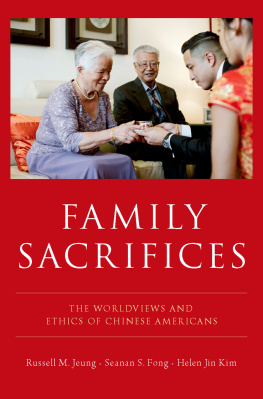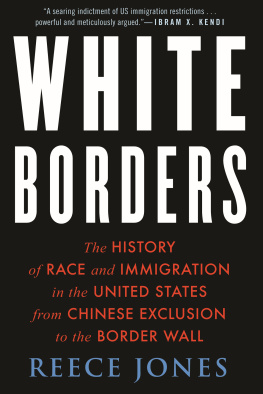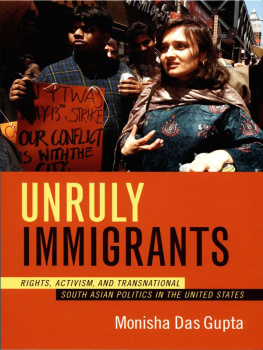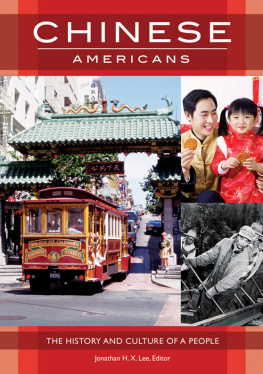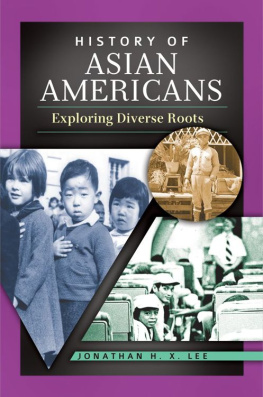
ASIAN AMERICA
A series edited by Gordon H. Chang
The increasing size and diversity of the Asian American population, its growing significance in American society and culture, and the expanded appreciation, both popular and scholarly, of the importance of Asian Americans in the countrys present and pastall these developments have converged to stimulate wide interest in scholarly work on topics related to the Asian American experience. The general recognition of the pivotal role that race and ethnicity have played in American life, and in relations between the United States and other countries, has also fostered the heightened attention.
Although Asian Americans were a subject of serious inquiry during the late nineteenth and early twentieth centuries, they were subsequently ignored by the mainstream scholarly community for several decades. In recent years, however, this neglect has ended, with an increasing number of writers examining many aspects of Asian American life and culture. Moreover, many students of American society are recognizing that the study of issues related to Asian America speak to, and may be essential for, many current discussions on the part of the informed public and various scholarly communities.
The Stanford series on Asian America seeks to address these interests, including works from the humanities and social scienceshistory, anthropology, political science, American studies, law, literary criticism, sociology, and interdisciplinary and policy studies.
A full list of titles in the Asian America series can be found online at www.sup.org/asianamerica .
Envisioning America
New Chinese Americans and the Politics of Belonging
Tritia Toyota
Stanford University Press
Stanford, California
2010 by the Board of Trustees of the Leland Stanford Junior University. All rights reserved.
No part of this book may be reproduced or transmitted in any form or by any means, electronic or mechanical, including photocopying and recording, or in any information storage or retrieval system without the prior written permission of Stanford University Press.
Printed in the United States of America on acid-free,
archival-quality paper
Library of Congress Cataloging-in-Publication Data
Toyota, Tritia.
Envisioning America : new Chinese Americans and the politics of belonging / Tritia Toyota.
p. cm.(Asian America)
Includes bibliographical references and index.
9780804772822
1. Chinese AmericansCalifornia, SouthernPolitical activityHistory20th century. 2. Asian AmericansCalifornia, SouthernPolitical activityHistory20th century. 3. Identity politicsCalifornia, SouthernHistory20th century. 4. Chinese AmericansEthnic identity. 5. Asian AmericansEthnic identity. 6. United StatesRace relationsPolitical aspects. I. Title. II. Series: Asian America.
E184.C5T75 2010
305.895107949dc22
2009023019
Typeset by Bruce Lundquist in 11/14 Adobe Garamond
Acknowledgments
Were it not for Don Nakanishi (director of the Asian American Studies Center at UCLA), I would never have produced this book. Over a period of 20 years, during which I worked full time in television news, he remained steadfast as a sounding board for my developing theoretical frameworks and a constant support in my academic endeavors. His knowledge of racialized political history and his vision and commitment to enlarge the discussion and create social change continue to inform my own positions. In addition, it was extremely providential that I had the opportunity to work with Karen Brodkin (professor of anthropology at UCLA). I am grateful for her never-ending patience, her spot-on critiques regarding the co-constitutive nature of race and global capital projects, and now her friendship. Her repeated entreaties to just Tell the story! kept me focused on what ethnography is all about and its continuing value to the discipline of anthropology. It has guided my own teaching. Most of all, to the new Chinese activists who didnt run when they saw me, my deepest thanks for permitting me, not just to repeat your stories, but to share them here, in a way that privileges what it means to be a twenty-first-century American.
In addition, I thank the following community organizations and elected officials for their permission to quote from public speeches, statements, letters, and press releases: the Asian American Journalists Association, the Asian Pacific American Legal Center, the Center for Asian Americans United for Self Empowerment, Chinese Elected Officials, the Committee of 100, California State Board of Equalization member Judy Chu, former California governor Gray Davis, California state assemblyman Mike Eng, and former Los Angeles city council member Mike Woo.
Introduction
For more than three decades, I have been privileged to have front-row seats at what is one of the mostfor me anywayexciting games in town. The game is about politics and, more specifically, about the construction of a communitys political identity. The ground rules are changeable; the players, the outline and location of the playing field, and the rewards of the game are in constant flux. It is a continually unpredictable process occurring within the Asian American community in Southern California, and since the late 1960s, the variability of alterations and modifications characterizes a community undergoing major transformation. I witnessed most of this dynamic struggle as a journalist of color in the Los Angeles area, working for the local news stations of two major U.S. television networks.
Being a journalist requires one to be a perpetual student and observer, something of which I always took advantage. There never was a time when I wasnt keen to insinuate myself into social processes in which people were actively fashioning membership in the Asian American community. My position as a news reporter and anchor gave me entre (though not always welcome) and allowed me to penetrate community structures, become acquainted with acknowledged leadership, and understand contextually how and why issues translated into collective agendas and actions. I came to know countless individuals, most of them, like myself, American-born and politically progressive. We were products of the contested discourses that expanded racial and social paradigms during the 1960s.
For my part, I was not permitted, either by news management or by viewers, to forget my own role in the grand experiment of diversity undertaken by major news corporations. In the aftermath of the transformative 1960s, a few enlightened members of television news media looked around the newsroom and saw a staff of mostly white men. I was a three-fer and a first: young, female, and Asian American. I felt an overwhelming responsibility to ensure that newsworthy stories in the Asian American community were covered fairly and accurately. During the early 1970s, most of my bosses, co-workers, and the viewing public did not share this enthusiasm. Other than the occasional story about Chinese New Year or the Nisei Week Parade, most other coverage of Asian America was insignificant. In part, this reflected the numerically small and largely politically insignificant Asian American community in Southern California at the time. That, of course, was about to change.
In the space of just one decade, I became aware of a large, new cohort of different Asian actors whose rapid appearance after 1965 was facilitated by dramatic changes in U.S. immigration law. They quickly enlarged everyday notions of a more traditional Asian American political identity. These putative new leaders, and therefore newsmakers, in Southern California were speaking English with accents. They were Chinese from Taiwan, Hong Kong, and even Mainland China. They were Asian Americans, but immigrant and naturalized. I did not know them, nor was I familiar with their leadership, methods of organizing, associations, important issues, or even where they lived. A television documentary I wrote and produced during the early 1980s was my attempt at making sense of the sweeping changes and increasing heterogeneity in the community.


